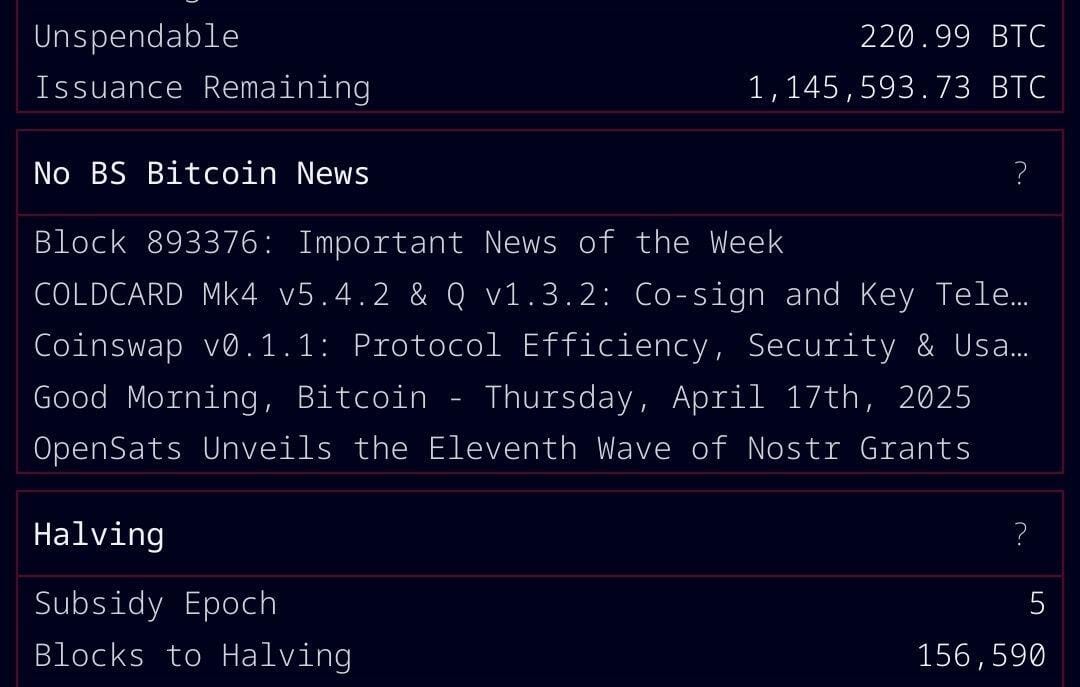-
 @ 4c96d763:80c3ee30
2025-05-31 22:53:56
@ 4c96d763:80c3ee30
2025-05-31 22:53:56Changes
pushed to notedeck:refs/heads/master
-
 @ 4c96d763:80c3ee30
2025-05-31 22:40:31
@ 4c96d763:80c3ee30
2025-05-31 22:40:31Changes
William Casarin (2):
- clippy: quick lint fix
- Fix text wrapping issues
kernelkind (13):
- hotfix: can login again
- TMP: use new egui-nav with popup
- add
SingletonRouter - nav: move action processing to own method
- nav: move process nav response to own method
- use router action
- use popup sheet for
CustomZapView - set variable for scroll offset
- appease clippy
- add
NoteId::from_bechmethod - add
SearchType - stop error log spam
- add search improvements
pushed to notedeck:refs/heads/master
-
 @ 7f6db517:a4931eda
2025-05-31 20:01:26
@ 7f6db517:a4931eda
2025-05-31 20:01:26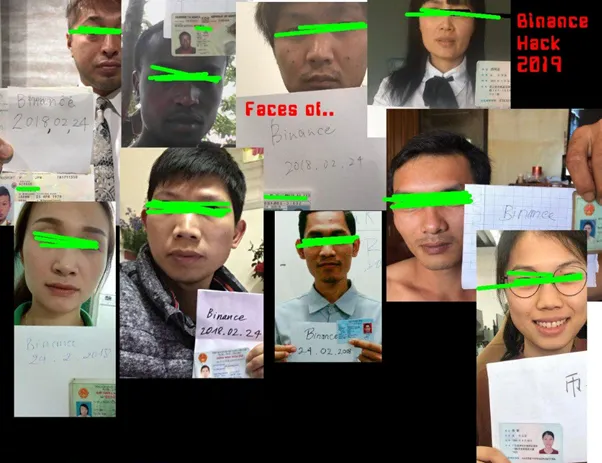
What is KYC/AML?
- The acronym stands for Know Your Customer / Anti Money Laundering.
- In practice it stands for the surveillance measures companies are often compelled to take against their customers by financial regulators.
- Methods differ but often include: Passport Scans, Driver License Uploads, Social Security Numbers, Home Address, Phone Number, Face Scans.
- Bitcoin companies will also store all withdrawal and deposit addresses which can then be used to track bitcoin transactions on the bitcoin block chain.
- This data is then stored and shared. Regulations often require companies to hold this information for a set number of years but in practice users should assume this data will be held indefinitely. Data is often stored insecurely, which results in frequent hacks and leaks.
- KYC/AML data collection puts all honest users at risk of theft, extortion, and persecution while being ineffective at stopping crime. Criminals often use counterfeit, bought, or stolen credentials to get around the requirements. Criminals can buy "verified" accounts for as little as $200. Furthermore, billions of people are excluded from financial services as a result of KYC/AML requirements.
During the early days of bitcoin most services did not require this sensitive user data, but as adoption increased so did the surveillance measures. At this point, most large bitcoin companies are collecting and storing massive lists of bitcoiners, our sensitive personal information, and our transaction history.
Lists of Bitcoiners
KYC/AML policies are a direct attack on bitcoiners. Lists of bitcoiners and our transaction history will inevitably be used against us.
Once you are on a list with your bitcoin transaction history that record will always exist. Generally speaking, tracking bitcoin is based on probability analysis of ownership change. Surveillance firms use various heuristics to determine if you are sending bitcoin to yourself or if ownership is actually changing hands. You can obtain better privacy going forward by using collaborative transactions such as coinjoin to break this probability analysis.
Fortunately, you can buy bitcoin without providing intimate personal information. Tools such as peach, hodlhodl, robosats, azteco and bisq help; mining is also a solid option: anyone can plug a miner into power and internet and earn bitcoin by mining privately.
You can also earn bitcoin by providing goods and/or services that can be purchased with bitcoin. Long term, circular economies will mitigate this threat: most people will not buy bitcoin - they will earn bitcoin - most people will not sell bitcoin - they will spend bitcoin.
There is no such thing as KYC or No KYC bitcoin, there are bitcoiners on lists and those that are not on lists.
If you found this post helpful support my work with bitcoin.

-
 @ dfa02707:41ca50e3
2025-05-31 22:01:39
@ dfa02707:41ca50e3
2025-05-31 22:01:39Contribute to keep No Bullshit Bitcoin news going.
-
Version 1.3 of Bitcoin Safe introduces a redesigned interactive chart, quick receive feature, updated icons, a mempool preview window, support for Child Pays For Parent (CPFP) and testnet4, preconfigured testnet demo wallets, as well as various bug fixes and improvements.
-
Upcoming updates for Bitcoin Safe include Compact Block Filters.
"Compact Block Filters increase the network privacy dramatically, since you're not asking an electrum server to give you your transactions. They are a little slower than electrum servers. For a savings wallet like Bitcoin Safe this should be OK," writes the project's developer Andreas Griffin.
- Learn more about the current and upcoming features of Bitcoin Safe wallet here.
What's new in v1.3
- Redesign of Chart, Quick Receive, Icons, and Mempool Preview (by @design-rrr).
- Interactive chart. Clicking on it now jumps to transaction, and selected transactions are now highlighted.
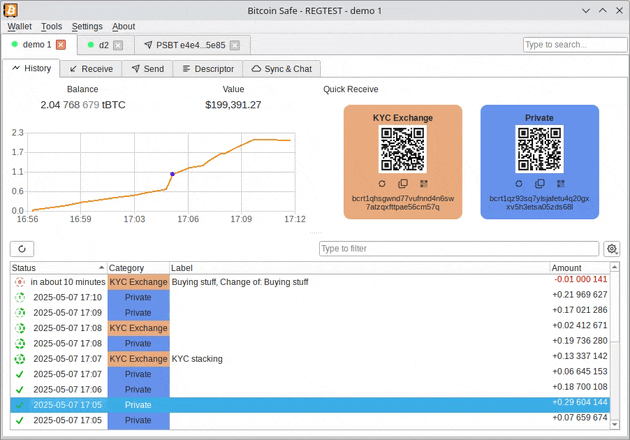
- Speed up transactions with Child Pays For Parent (CPFP).
- BDK 1.2 (upgraded from 0.32).
- Testnet4 support.
- Preconfigured Testnet demo wallets.
- Cluster unconfirmed transactions so that parents/children are next to each other.
- Customizable columns for all tables (optional view: Txid, Address index, and more)
- Bug fixes and other improvements.
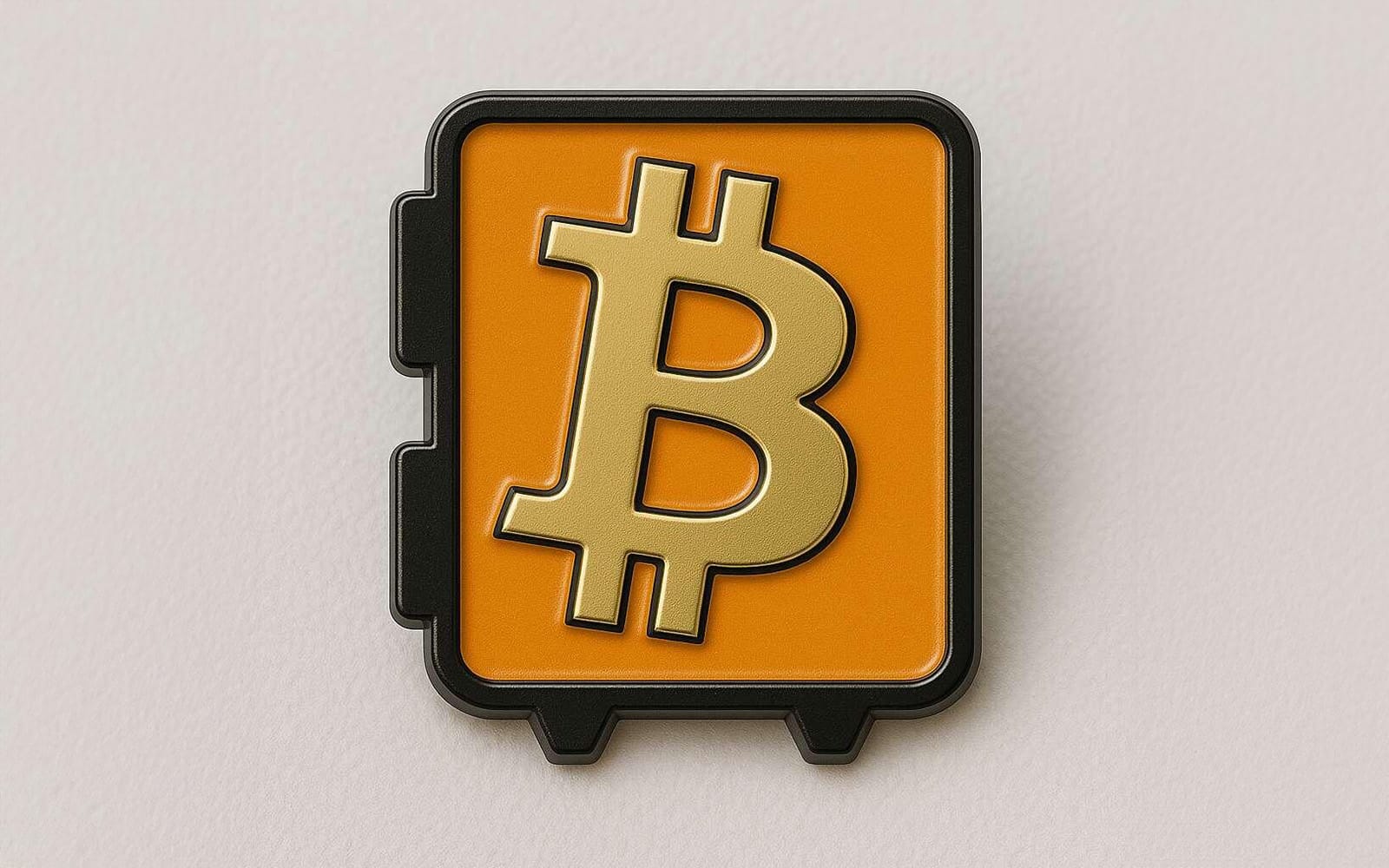
Announcement / Archive
Blog Post / Archive
GitHub Repo
Website -
-
 @ 84b0c46a:417782f5
2025-05-31 09:11:23
@ 84b0c46a:417782f5
2025-05-31 09:11:23Simple Long Form Content Editor (NIP-23)
機能
-
nostr:npub1sjcvg64knxkrt6ev52rywzu9uzqakgy8ehhk8yezxmpewsthst6sw3jqcw や、 nostr:nevent1qvzqqqqqqypzq4jsz7zew5j7jr4pdfxh483nwq9vyw9ph6wm706sjwrzj2we58nqqyxhwumn8ghj77tpvf6jumt9qys8wumn8ghj7un9d3shjtt2wqhxummnw3ezuamfwfjkgmn9wshx5uqpr4mhxue69uhhyetvv9ujumn0wd68ytnhd9ex2erwv46zu6nsqyxhwumn8ghj7mn0wvhxcmmvqqsgcn99jyn5tevxz5zxsrkd7h0sx8fwnqztula423xh83j9wau7cms3vg9c7 のようにnostr:要素を挿入できる (メニューのNアイコンから挿入またはnostr:note~~のように手動で入力)
-
:monoice:のようにカスタム絵文字を挿入できる(メニューの🙂アイコンから)
:monopaca_kao:
:kubipaca_karada:
- 新規記事作成と、既存記事の修正ができる
やることやったこと
-
[x] nostr:を投稿するときにtagにいれる
-
[x] 画像をアップロードできるようにする(NIP-96)
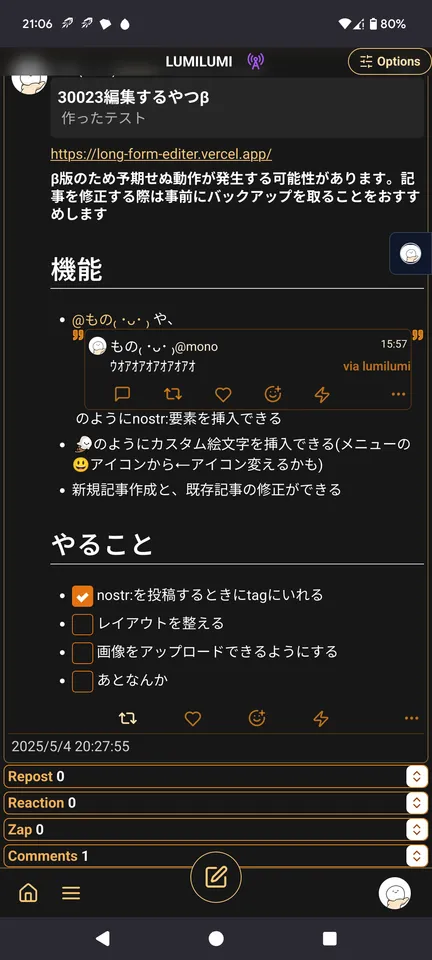 できる
できる - [x] 投稿しましたログとかをトースト的なやつでだすようにする
- [ ] レイアウトを整える
- [ ] あとなんか
test
nostr:naddr1qvzqqqr4gupzpp9sc34tdxdvxh4jeg5xgu9ctcypmvsg0n00vwfjydkrjaqh0qh4qqxnzde58q6njvpkxqersv3ejxw9x9
-
-
 @ b1ddb4d7:471244e7
2025-05-31 22:00:58
@ b1ddb4d7:471244e7
2025-05-31 22:00:58Bitcoin FilmFest (BFF25) returns to Warsaw for its third edition, blending independent cinema—from feature films and commercials to AI-driven experimental visuals—with education and entertainment.
Hundreds of attendees from around the world will gather for three days of screenings, discussions, workshops, and networking at the iconic Kinoteka Cinema (PKiN), the same venue that hosted the festival’s first two editions in March 2023 and April 2024.
This year’s festival, themed “Beyond the Frame,” introduces new dimensions to its program, including an extra day on May 22 to celebrate Bitcoin Pizza Day, the first real-world bitcoin transaction, with what promises to be one of Europe’s largest commemorations of this milestone.
BFF25 bridges independent film, culture, and technology, with a bold focus on decentralized storytelling and creative expression. As a community-driven cultural experience with a slightly rebellious spirit, Bitcoin FilmFest goes beyond movies, yet cinema remains at its heart.
Here’s a sneak peek at the lineup, specially curated for movie buffs:
 Generative Cinema – A special slot with exclusive shorts and a thematic debate on the intersection of AI and filmmaking. Featured titles include, for example: BREAK FREE, SATOSHI: THE CREATION OF BITCOIN, STRANGE CURRENCIES, and BITCOIN IS THE MYCELIUM OF MONEY, exploring financial independence, traps of the fiat system, and a better future built on sound money.
Generative Cinema – A special slot with exclusive shorts and a thematic debate on the intersection of AI and filmmaking. Featured titles include, for example: BREAK FREE, SATOSHI: THE CREATION OF BITCOIN, STRANGE CURRENCIES, and BITCOIN IS THE MYCELIUM OF MONEY, exploring financial independence, traps of the fiat system, and a better future built on sound money. Upcoming Productions Preview – A bit over an hour-long block of unreleased pilots and works-in-progress. Attendees will get exclusive first looks at projects like FINDING HOME (a travel-meets-personal-journey series), PARALLEL SPACES (a story about alternative communities), and THE LEGEND OF LANDI (a mysterious narrative).
Upcoming Productions Preview – A bit over an hour-long block of unreleased pilots and works-in-progress. Attendees will get exclusive first looks at projects like FINDING HOME (a travel-meets-personal-journey series), PARALLEL SPACES (a story about alternative communities), and THE LEGEND OF LANDI (a mysterious narrative). Freedom-Focused Ads & Campaigns – Unique screenings of video commercials, animations, and visual projects, culminating in “The PoWies” (Proof of Work-ies)—the first ever awards show honoring the best Bitcoin-only awareness campaigns.
Freedom-Focused Ads & Campaigns – Unique screenings of video commercials, animations, and visual projects, culminating in “The PoWies” (Proof of Work-ies)—the first ever awards show honoring the best Bitcoin-only awareness campaigns.To get an idea of what might come up at the event, here, you can preview 6 selected ads combined into two 2 videos:
 Open Pitch Competition – A chance for filmmakers to present fresh ideas and unfinished projects to an audience of a dedicated jury, movie fans and potential collaborators. This competitive block isn’t just entertaining—it’s a real opportunity for creators to secure funding and partnerships.
Open Pitch Competition – A chance for filmmakers to present fresh ideas and unfinished projects to an audience of a dedicated jury, movie fans and potential collaborators. This competitive block isn’t just entertaining—it’s a real opportunity for creators to secure funding and partnerships. Golden Rabbit Awards: A lively gala honoring films from the festival’s Official Selection, with awards in categories like Best Feature, Best Story, Best Short, and Audience Choice.
Golden Rabbit Awards: A lively gala honoring films from the festival’s Official Selection, with awards in categories like Best Feature, Best Story, Best Short, and Audience Choice.BFF25 Main Screenings
Sample titles from BFF25’s Official Selection:
 REVOLUCIÓN BITCOIN – A documentary by Juan Pablo, making its first screening outside the Spanish-speaking world in Warsaw this May. Three years of important work, 80 powerful minutes to experience. The film explores Bitcoin’s impact across Argentina, Colombia, Mexico, El Salvador, and Spain through around 40 diverse perspectives. Screening in Spanish with English subtitles, followed by a Q&A with the director.
REVOLUCIÓN BITCOIN – A documentary by Juan Pablo, making its first screening outside the Spanish-speaking world in Warsaw this May. Three years of important work, 80 powerful minutes to experience. The film explores Bitcoin’s impact across Argentina, Colombia, Mexico, El Salvador, and Spain through around 40 diverse perspectives. Screening in Spanish with English subtitles, followed by a Q&A with the director. UNBANKABLE – Luke Willms’ directorial debut, drawing from his multicultural roots and his father’s pioneering HIV/AIDS research. An investigative documentary based on Luke’s journeys through seven African countries, diving into financial experiments and innovations—from mobile money and digital lending to Bitcoin—raising smart questions and offering potential lessons for the West. Its May appearance at BFF25 marks its largest European event to date, following festival screenings and nominations across multiple continents over the past year.
UNBANKABLE – Luke Willms’ directorial debut, drawing from his multicultural roots and his father’s pioneering HIV/AIDS research. An investigative documentary based on Luke’s journeys through seven African countries, diving into financial experiments and innovations—from mobile money and digital lending to Bitcoin—raising smart questions and offering potential lessons for the West. Its May appearance at BFF25 marks its largest European event to date, following festival screenings and nominations across multiple continents over the past year. HOTEL BITCOIN – A Spanish comedy directed by Manuel Sanabria and Carlos “Pocho” Villaverde. Four friends, 4,000 bitcoins , and one laptop spark a chaotic adventure of parties, love, crime, and a dash of madness. Exploring sound money, value, and relationships through a twisting plot. The film premiered at the Tarazona and Moncayo Comedy Film Festival in August 2024. Its Warsaw screening at BFF25 (in Spanish with English subtitles) marks its first public showing outside the Spanish-speaking world.
HOTEL BITCOIN – A Spanish comedy directed by Manuel Sanabria and Carlos “Pocho” Villaverde. Four friends, 4,000 bitcoins , and one laptop spark a chaotic adventure of parties, love, crime, and a dash of madness. Exploring sound money, value, and relationships through a twisting plot. The film premiered at the Tarazona and Moncayo Comedy Film Festival in August 2024. Its Warsaw screening at BFF25 (in Spanish with English subtitles) marks its first public showing outside the Spanish-speaking world.Check out trailers for this year’s BFF25 and past editions on YouTube.
Tickets & Info:
- Detailed program and tickets are available at bitcoinfilmfest.com/bff25.
- Stay updated via the festival’s official channels (links provided on the website).
- Use ‘LN-NEWS’ to get 10% of tickets
-
 @ 7f6db517:a4931eda
2025-05-31 09:01:33
@ 7f6db517:a4931eda
2025-05-31 09:01:33

"Privacy is necessary for an open society in the electronic age. Privacy is not secrecy. A private matter is something one doesn't want the whole world to know, but a secret matter is something one doesn't want anybody to know. Privacy is the power to selectively reveal oneself to the world." - Eric Hughes, A Cypherpunk's Manifesto, 1993
Privacy is essential to freedom. Without privacy, individuals are unable to make choices free from surveillance and control. Lack of privacy leads to loss of autonomy. When individuals are constantly monitored it limits our ability to express ourselves and take risks. Any decisions we make can result in negative repercussions from those who surveil us. Without the freedom to make choices, individuals cannot truly be free.
Freedom is essential to acquiring and preserving wealth. When individuals are not free to make choices, restrictions and limitations prevent us from economic opportunities. If we are somehow able to acquire wealth in such an environment, lack of freedom can result in direct asset seizure by governments or other malicious entities. At scale, when freedom is compromised, it leads to widespread economic stagnation and poverty. Protecting freedom is essential to economic prosperity.
The connection between privacy, freedom, and wealth is critical. Without privacy, individuals lose the freedom to make choices free from surveillance and control. While lack of freedom prevents individuals from pursuing economic opportunities and makes wealth preservation nearly impossible. No Privacy? No Freedom. No Freedom? No Wealth.
Rights are not granted. They are taken and defended. Rights are often misunderstood as permission to do something by those holding power. However, if someone can give you something, they can inherently take it from you at will. People throughout history have necessarily fought for basic rights, including privacy and freedom. These rights were not given by those in power, but rather demanded and won through struggle. Even after these rights are won, they must be continually defended to ensure that they are not taken away. Rights are not granted - they are earned through struggle and defended through sacrifice.
If you found this post helpful support my work with bitcoin.

-
 @ 7f6db517:a4931eda
2025-05-31 21:01:32
@ 7f6db517:a4931eda
2025-05-31 21:01:32
Nostr is an open communication protocol that can be used to send messages across a distributed set of relays in a censorship resistant and robust way.
If you missed my nostr introduction post you can find it here. My nostr account can be found here.
We are nearly at the point that if something interesting is posted on a centralized social platform it will usually be posted by someone to nostr.
We are nearly at the point that if something interesting is posted exclusively to nostr it is cross posted by someone to various centralized social platforms.
We are nearly at the point that you can recommend a cross platform app that users can install and easily onboard without additional guides or resources.
As companies continue to build walls around their centralized platforms nostr posts will be the easiest to cross reference and verify - as companies continue to censor their users nostr is the best censorship resistant alternative - gradually then suddenly nostr will become the standard. 🫡
Current Nostr Stats
If you found this post helpful support my work with bitcoin.

-
 @ a3c6f928:d45494fb
2025-05-31 18:52:24
@ a3c6f928:d45494fb
2025-05-31 18:52:24Fear is one of the most powerful forces that shapes our decisions, limits our growth, and holds us back from living fully. Yet, freedom from fear is not about becoming fearless—it's about no longer allowing fear to control us. In uncertain times, reclaiming our power means learning how to face fear, understand it, and ultimately rise above it.
Understanding Fear’s Grip
Fear thrives in the unknown. It whispers worst-case scenarios, paralyzes action, and magnifies our sense of powerlessness. But fear is also a signal. It tells us where growth lies, where change is needed, and where courage must rise.
What Freedom from Fear Looks Like
Taking Action Despite Anxiety: You feel the fear, but you move forward anyway.
Letting Go of Control: You stop trying to predict or perfect every outcome.
Trusting Yourself: You believe in your ability to adapt and respond.
Embracing Uncertainty: You understand that discomfort is part of transformation.
Steps Toward Reclaiming Power
-
Name the Fear: Clarity shrinks fear. When you name what you're afraid of, it loses some of its grip.
-
Breathe Through It: Deep breathing brings you back to the present, where fear often has less power.
-
Challenge the Narrative: Ask: "Is this true? Is this fear protecting me or limiting me?"
-
Take Small Steps: Fear often dissolves when met with action. Start small, but start.
-
Build a Resilient Mindset: Remind yourself of what you've overcome before. You are stronger than your fear.
Why It Matters Now
In a world filled with rapid change, fear can become a default state. But freedom is a choice. A daily one. When you stop letting fear steer your life, you open the door to possibilities, growth, and deeper peace.
“Fear does not stop death. It stops life.”
Choose courage. Claim your power. Walk freely—even through fear.
-
-
 @ 7f6db517:a4931eda
2025-05-31 15:01:42
@ 7f6db517:a4931eda
2025-05-31 15:01:42

"Privacy is necessary for an open society in the electronic age. Privacy is not secrecy. A private matter is something one doesn't want the whole world to know, but a secret matter is something one doesn't want anybody to know. Privacy is the power to selectively reveal oneself to the world." - Eric Hughes, A Cypherpunk's Manifesto, 1993
Privacy is essential to freedom. Without privacy, individuals are unable to make choices free from surveillance and control. Lack of privacy leads to loss of autonomy. When individuals are constantly monitored it limits our ability to express ourselves and take risks. Any decisions we make can result in negative repercussions from those who surveil us. Without the freedom to make choices, individuals cannot truly be free.
Freedom is essential to acquiring and preserving wealth. When individuals are not free to make choices, restrictions and limitations prevent us from economic opportunities. If we are somehow able to acquire wealth in such an environment, lack of freedom can result in direct asset seizure by governments or other malicious entities. At scale, when freedom is compromised, it leads to widespread economic stagnation and poverty. Protecting freedom is essential to economic prosperity.
The connection between privacy, freedom, and wealth is critical. Without privacy, individuals lose the freedom to make choices free from surveillance and control. While lack of freedom prevents individuals from pursuing economic opportunities and makes wealth preservation nearly impossible. No Privacy? No Freedom. No Freedom? No Wealth.
Rights are not granted. They are taken and defended. Rights are often misunderstood as permission to do something by those holding power. However, if someone can give you something, they can inherently take it from you at will. People throughout history have necessarily fought for basic rights, including privacy and freedom. These rights were not given by those in power, but rather demanded and won through struggle. Even after these rights are won, they must be continually defended to ensure that they are not taken away. Rights are not granted - they are earned through struggle and defended through sacrifice.
If you found this post helpful support my work with bitcoin.

-
 @ 7f6db517:a4931eda
2025-05-31 15:01:41
@ 7f6db517:a4931eda
2025-05-31 15:01:41
Nostr is an open communication protocol that can be used to send messages across a distributed set of relays in a censorship resistant and robust way.
If you missed my nostr introduction post you can find it here. My nostr account can be found here.
We are nearly at the point that if something interesting is posted on a centralized social platform it will usually be posted by someone to nostr.
We are nearly at the point that if something interesting is posted exclusively to nostr it is cross posted by someone to various centralized social platforms.
We are nearly at the point that you can recommend a cross platform app that users can install and easily onboard without additional guides or resources.
As companies continue to build walls around their centralized platforms nostr posts will be the easiest to cross reference and verify - as companies continue to censor their users nostr is the best censorship resistant alternative - gradually then suddenly nostr will become the standard. 🫡
Current Nostr Stats
If you found this post helpful support my work with bitcoin.

-
 @ dfa02707:41ca50e3
2025-05-31 14:01:43
@ dfa02707:41ca50e3
2025-05-31 14:01:43Contribute to keep No Bullshit Bitcoin news going.
- The latest firmware updates for COLDCARD devices introduce two major features: COLDCARD Co-sign (CCC) and Key Teleport between two COLDCARD Q devices using QR codes and/or NFC with a website.

What's new
- COLDCARD Co-Sign: When CCC is enabled, a second seed called the Spending Policy Key (Key C) is added to the device. This seed works with the device's Main Seed and one or more additional XPUBs (Backup Keys) to form 2-of-N multisig wallets.
- The spending policy functions like a hardware security module (HSM), enforcing rules such as magnitude and velocity limits, address whitelisting, and 2FA authentication to protect funds while maintaining flexibility and control, and is enforced each time the Spending Policy Key is used for signing.
- When spending conditions are met, the COLDCARD signs the partially signed bitcoin transaction (PSBT) with the Main Seed and Spending Policy Key for fund access. Once configured, the Spending Policy Key is required to view or change the policy, and violations are denied without explanation.
"You can override the spending policy at any time by signing with either a Backup Key and the Main Seed or two Backup Keys, depending on the number of keys (N) in the multisig."
-
A step-by-step guide for setting up CCC is available here.
-
Key Teleport for Q devices allows users to securely transfer sensitive data such as seed phrases (words, xprv), secure notes and passwords, and PSBTs for multisig. It uses QR codes or NFC, along with a helper website, to ensure reliable transmission, keeping your sensitive data protected throughout the process.
- For more technical details, see the protocol spec.
"After you sign a multisig PSBT, you have option to “Key Teleport” the PSBT file to any one of the other signers in the wallet. We already have a shared pubkey with them, so the process is simple and does not require any action on their part in advance. Plus, starting in this firmware release, COLDCARD can finalize multisig transactions, so the last signer can publish the signed transaction via PushTX (NFC tap) to get it on the blockchain directly."
- Multisig transactions are finalized when sufficiently signed. It streamlines the use of PushTX with multisig wallets.
- Signing artifacts re-export to various media. Users are now provided with the capability to export signing products, like transactions or PSBTs, to alternative media rather than the original source. For example, if a PSBT is received through a QR code, it can be signed and saved onto an SD card if needed.
- Multisig export files are signed now. Public keys are encoded as P2PKH address for all multisg signature exports. Learn more about it here.
- NFC export usability upgrade: NFC keeps exporting until CANCEL/X is pressed.
- Added Bitcoin Safe option to Export Wallet.
- 10% performance improvement in USB upload speed for large files.
- Q: Always choose the biggest possible display size for QR.
Fixes
- Do not allow change Main PIN to same value already used as Trick PIN, even if Trick PIN is hidden.
- Fix stuck progress bar under
Receiving...after a USB communications failure. - Showing derivation path in Address Explorer for root key (m) showed double slash (//).
- Can restore developer backup with custom password other than 12 words format.
- Virtual Disk auto mode ignores already signed PSBTs (with “-signed” in file name).
- Virtual Disk auto mode stuck on “Reading…” screen sometimes.
- Finalization of foreign inputs from partial signatures. Thanks Christian Uebber!
- Temporary seed from COLDCARD backup failed to load stored multisig wallets.
Destroy Seedalso removes all Trick PINs from SE2.Lock Down Seedrequires pressing confirm key (4) to execute.- Q only: Only BBQr is allowed to export Coldcard, Core, and pretty descriptor.
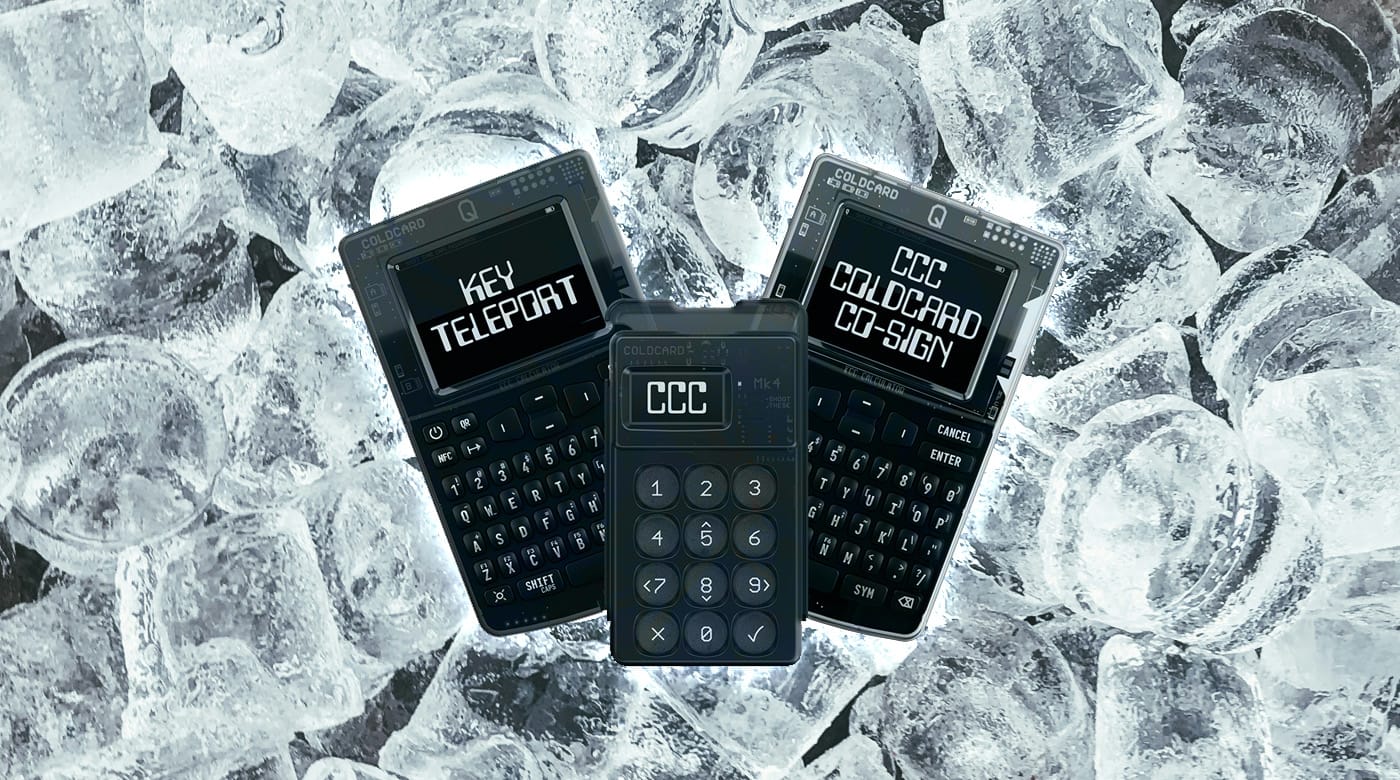
-
 @ dfa02707:41ca50e3
2025-05-31 14:01:38
@ dfa02707:41ca50e3
2025-05-31 14:01:38- This version introduces the Soroban P2P network, enabling Dojo to relay transactions to the Bitcoin network and share others' transactions to break the heuristic linking relaying nodes to transaction creators.
- Additionally, Dojo admins can now manage API keys in DMT with labels, status, and expiration, ideal for community Dojo providers like Dojobay. New API endpoints, including "/services" exposing Explorer, Soroban, and Indexer, have been added to aid wallet developers.
- Other maintenance updates include Bitcoin Core, Tor, Fulcrum, Node.js, plus an updated ban-knots script to disconnect inbound Knots nodes.
"I want to thank all the contributors. This again shows the power of true Free Software. I also want to thank everyone who donated to help Dojo development going. I truly appreciate it," said Still Dojo Coder.
What's new
- Soroban P2P network. For MyDojo (Docker setup) users, Soroban will be automatically installed as part of their Dojo. This integration allows Dojo to utilize the Soroban P2P network for various upcoming features and applications.
- PandoTx. PandoTx serves as a transaction transport layer. When your wallet sends a transaction to Dojo, it is relayed to a random Soroban node, which then forwards it to the Bitcoin network. It also enables your Soroban node to receive and relay transactions from others to the Bitcoin network and is designed to disrupt the assumption that a node relaying a transaction is closely linked to the person who initiated it.
- Pushing transactions through Soroban can be deactivated by setting
NODE_PANDOTX_PUSH=offindocker-node.conf. - Processing incoming transactions from Soroban network can be deactivated by setting
NODE_PANDOTX_PROCESS=offindocker-node.conf.
- Pushing transactions through Soroban can be deactivated by setting
- API key management has been introduced to address the growing number of people offering their Dojos to the community. Dojo admins can now access a new API management tab in their DMT, where they can create unlimited API keys, assign labels for easy identification, and set expiration dates for each key. This allows admins to avoid sharing their main API key and instead distribute specific keys to selected parties.
- New API endpoints. Several new API endpoints have been added to help API consumers develop features on Dojo more efficiently:
- New:
/latest-block- returns data about latest block/txout/:txid/:index- returns unspent output data/support/services- returns info about services that Dojo exposes
- Updated:
/tx/:txid- endpoint has been updated to return raw transaction with parameter?rawHex=1
- The new
/support/servicesendpoint replaces the deprecatedexplorerfield in the Dojo pairing payload. Although still present, API consumers should use this endpoint for explorer and other pairing data.
- New:
Other changes
- Updated ban script to disconnect inbound Knots nodes.
- Updated Fulcrum to v1.12.0.
- Regenerate Fulcrum certificate if expired.
- Check if transaction already exists in pushTx.
- Bump BTC-RPC Explorer.
- Bump Tor to v0.4.8.16, bump Snowflake.
- Updated Bitcoin Core to v29.0.
- Removed unnecessary middleware.
- Fixed DB update mechanism, added api_keys table.
- Add an option to use blocksdir config for bitcoin blocks directory.
- Removed deprecated configuration.
- Updated Node.js dependencies.
- Reconfigured container dependencies.
- Fix Snowflake git URL.
- Fix log path for testnet4.
- Use prebuilt addrindexrs binaries.
- Add instructions to migrate blockchain/fulcrum.
- Added pull policies.


Learn how to set up and use your own Bitcoin privacy node with Dojo here.
-
 @ dfa02707:41ca50e3
2025-05-31 08:01:28
@ dfa02707:41ca50e3
2025-05-31 08:01:28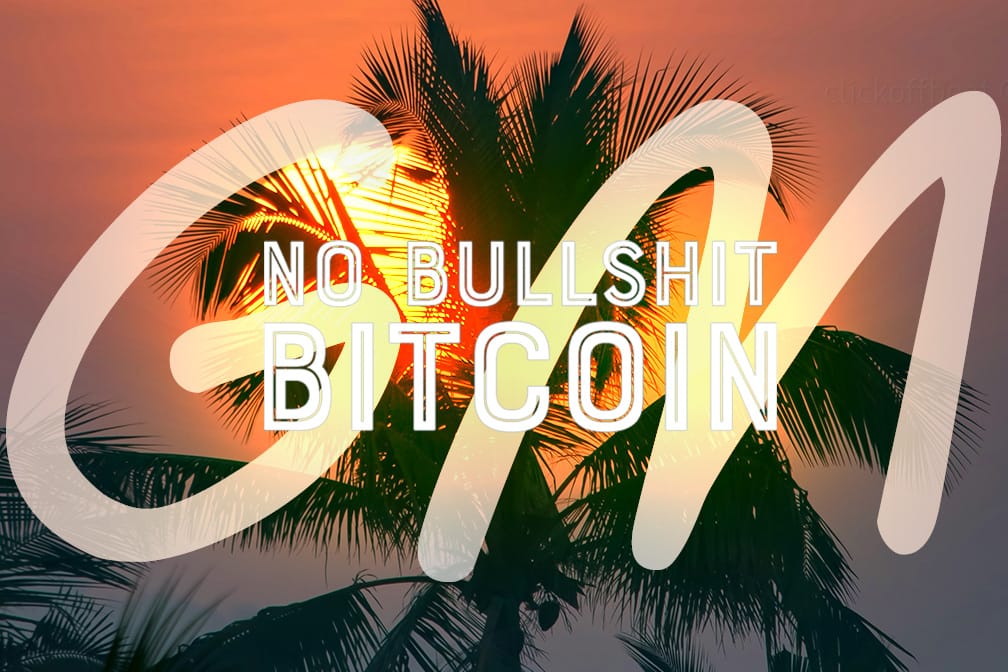
Good morning (good night?)! The No Bullshit Bitcoin news feed is now available on Moody's Dashboard! A huge shoutout to sir Clark Moody for integrating our feed.
Headlines
- Spiral welcomes Ben Carman. The developer will work on the LDK server and a new SDK designed to simplify the onboarding process for new self-custodial Bitcoin users.
- The Bitcoin Dev Kit Foundation announced new corporate members for 2025, including AnchorWatch, CleanSpark, and Proton Foundation. The annual dues from these corporate members fund the small team of open-source developers responsible for maintaining the core BDK libraries and related free and open-source software (FOSS) projects.
- Strategy increases Bitcoin holdings to 538,200 BTC. In the latest purchase, the company has spent more than $555M to buy 6,556 coins through proceeds of two at-the-market stock offering programs.
- Spar supermarket experiments with Bitcoin payments in Zug, Switzerland. The store has introduced a new payment method powered by the Lightning Network. The implementation was facilitated by DFX Swiss, a service that supports seamless conversions between bitcoin and legacy currencies.
- The Bank for International Settlements (BIS) wants to contain 'crypto' risks. A report titled "Cryptocurrencies and Decentralised Finance: Functions and Financial Stability Implications" calls for expanding research into "how new forms of central bank money, capital controls, and taxation policies can counter the risks of widespread crypto adoption while still fostering technological innovation."
- "Global Implications of Scam Centres, Underground Banking, and Illicit Online Marketplaces in Southeast Asia." According to the United Nations Office on Drugs and Crime (UNODC) report, criminal organizations from East and Southeast Asia are swiftly extending their global reach. These groups are moving beyond traditional scams and trafficking, creating sophisticated online networks that include unlicensed cryptocurrency exchanges, encrypted communication platforms, and stablecoins, fueling a massive fraud economy on an industrial scale.
- Slovenia is considering a 25% capital gains tax on Bitcoin profits for individuals. The Ministry of Finance has proposed legislation to impose this tax on gains from cryptocurrency transactions, though exchanging one cryptocurrency for another would remain exempt. At present, individual 'crypto' traders in Slovenia are not taxed.
- Circle, BitGo, Coinbase, and Paxos plan to apply for U.S. bank charters or licenses. According to a report in The Wall Street Journal, major crypto companies are planning to apply for U.S. bank charters or licenses. These firms are pursuing limited licenses that would permit them to issue stablecoins, as the U.S. Congress deliberates on legislation mandating licensing for stablecoin issuers.
"Established banks, like Bank of America, are hoping to amend the current drafts of [stablecoin] legislation in such a way that nonbanks are more heavily restricted from issuing stablecoins," people familiar with the matter told The Block.
- Charles Schwab to launch spot Bitcoin trading by 2026. The financial investment firm, managing over $10 trillion in assets, has revealed plans to introduce spot Bitcoin trading for its clients within the next year.
Use the tools
- Bitcoin Safe v1.2.3 expands QR SignMessage compatibility for all QR-UR-compatible hardware signers (SpecterDIY, KeyStone, Passport, Jade; already supported COLDCARD Q). It also adds the ability to import wallets via QR, ensuring compatibility with Keystone's latest firmware (2.0.6), alongside other improvements.
- Minibits v0.2.2-beta, an ecash wallet for Android devices, packages many changes to align the project with the planned iOS app release. New features and improvements include the ability to lock ecash to a receiver's pubkey, faster confirmations of ecash minting and payments thanks to WebSockets, UI-related fixes, and more.
- Zeus v0.11.0-alpha1 introduces Cashu wallets tied to embedded LND wallets. Navigate to Settings > Ecash to enable it. Other wallet types can still sweep funds from Cashu tokens. Zeus Pay now supports Cashu address types in Zaplocker, Cashu, and NWC modes.
- LNDg v1.10.0, an advanced web interface designed for analyzing Lightning Network Daemon (LND) data and automating node management tasks, introduces performance improvements, adds a new metrics page for unprofitable and stuck channels, and displays warnings for batch openings. The Profit and Loss Chart has been updated to include on-chain costs. Advanced settings have been added for users who would like their channel database size to be read remotely (the default remains local). Additionally, the AutoFees tool now uses aggregated pubkey metrics for multiple channels with the same peer.
- Nunchuk Desktop v1.9.45 release brings the latest bug fixes and improvements.
- Blockstream Green iOS v4.1.8 has renamed L-BTC to LBTC, and improves translations of notifications, login time, and background payments.
- Blockstream Green Android v4.1.8 has added language preference in App Settings and enables an Android data backup option for disaster recovery. Additionally, it fixes issues with Jade entry point PIN timeout and Trezor passphrase input.
- Torq v2.2.2, an advanced Lightning node management software designed to handle large nodes with over 1000 channels, fixes bugs that caused channel balance to not be updated in some cases and channel "peer total local balance" not getting updated.
- Stack Wallet v2.1.12, a multicoin wallet by Cypher Stack, fixes an issue with Xelis introduced in the latest release for Windows.
- ESP-Miner-NerdQAxePlus v1.0.29.1, a forked version from the NerdAxe miner that was modified for use on the NerdQAxe+, is now available.
- Zark enables sending sats to an npub using Bark.

- Erk is a novel variation of the Ark protocol that completely removes the need for user interactivity in rounds, addressing one of Ark's key limitations: the requirement for users to come online before their VTXOs expire.
- Aegis v0.1.1 is now available. It is a Nostr event signer app for iOS devices.
- Nostash is a NIP-07 Nostr signing extension for Safari. It is a fork of Nostore and is maintained by Terry Yiu. Available on iOS TestFlight.
- Amber v3.2.8, a Nostr event signer for Android, delivers the latest fixes and improvements.
- Nostur v1.20.0, a Nostr client for iOS, adds
-
 @ 90c656ff:9383fd4e
2025-05-31 18:09:27
@ 90c656ff:9383fd4e
2025-05-31 18:09:27Since its emergence in 2009, Bitcoin has generated a wide range of success and failure stories. Some of these stories feature people who invested early and reaped the rewards of their foresight, while others highlight the ups and downs that define Bitcoin’s highly volatile market. Over the years, many of these cases have become iconic—serving as both inspiration and cautionary tales for newcomers.
Success stories
01 - Laszlo Hanyecz – The 10,000 Bitcoin Pizza
One of the most legendary stories in Bitcoin’s history involves Laszlo Hanyecz, a programmer from Florida. In 2010, he paid 10,000 bitcoins for two pizzas. At the time, the value was negligible, and the transaction went largely unnoticed. In retrospect, however, those 10,000 bitcoins would be worth hundreds of millions of dollars today.
Though Hanyecz didn’t become rich from this transaction, the story of the “10,000 bitcoin pizza” has become a symbol of Bitcoin’s extraordinary rise in value—and a reminder of how even small holdings in the early days could have been life-changing.
02 - Michael Saylor and MicroStrategy
Michael Saylor, CEO of MicroStrategy, made headlines in 2020 by transforming his company into the first major corporation to invest heavily in Bitcoin. Purchasing over 100,000 bitcoins as a treasury reserve, Saylor positioned Bitcoin as a strategic hedge against inflation and fiat currency devaluation.
Initially met with skepticism, Saylor’s decision turned out to be highly profitable as Bitcoin’s price soared. His bold move inspired other corporations and institutional investors to consider Bitcoin, and he remains one of the cryptocurrency’s most vocal advocates in the business world.
Failure Stories
01 - James Howells – The Lost 8,000 Bitcoins
James Howells, an IT professional from Wales, accidentally discarded a hard drive in 2013 containing the private keys to 8,000 mined bitcoins—worth only a few thousand pounds at the time. As Bitcoin's value skyrocketed, he attempted to recover the drive from a landfill, but was denied permission by local authorities.
This story has become a powerful lesson in crypto security and the consequences of lost private keys. Despite multiple campaigns to dig up the landfill, the bitcoins remain unrecovered.
02 - Mt. Gox Collapse – The Fall of a Giant
At its peak, Mt. Gox was the largest Bitcoin exchange in the world. In 2014, it collapsed after losing about 850,000 bitcoins—worth over $450 million at the time—due to hacking, internal security failures, and poor management.
The exchange’s failure devastated thousands of investors and highlighted the vulnerabilities in early crypto infrastructure. Though some funds were later recovered, the Mt. Gox disaster remains one of Bitcoin’s darkest moments and a turning point for the push toward greater security and transparency in the crypto industry.
- The impact of volatility and adoption
These stories reflect the unpredictable and high-risk nature of the Bitcoin market. The same volatility that has made millionaires has also led to substantial losses. While some view Bitcoin as a path to financial freedom and a hedge against inflation, others have suffered from poor planning, mismanagement, or unfortunate timing.
Bitcoin’s growing adoption, especially in emerging markets and among institutional players and shows its increasing legitimacy, as an alternative to traditional finance. However, exchange failures and lost fortunes underscore the need for robust infrastructure, personal responsibility, and long-term thinking.
In summary, success and failure are two sides of the same coin in the world of Bitcoin. From life-changing gains to heartbreaking losses, these stories illustrate the risks and rewards of participating in a young and volatile market. Whether as a cautionary tale or a source of inspiration, they emphasize the importance of education, security, and strategy for anyone engaging with this revolutionary form of money.
Thank you very much for reading this far. I hope everything is well with you, and sending a big hug from your favorite Bitcoiner maximalist from Madeira. Long live freedom!
-
 @ 90c656ff:9383fd4e
2025-05-31 18:01:32
@ 90c656ff:9383fd4e
2025-05-31 18:01:32Since its launch in 2009, Bitcoin has attracted the attention of a wide range of investors and visionaries who believe in its potential to revolutionize the global financial system. Over the years, several figures have stood out within the movement—either as pioneers who helped build it or as investors who bet on its future. These individuals have played crucial roles in Bitcoin's development, its growing adoption, and its legitimacy in financial markets.
- Satoshi Nakamoto
The most significant Bitcoin pioneer is undoubtedly its creator, Satoshi Nakamoto. Although the name is a pseudonym, Nakamoto's contribution to the creation and launch of Bitcoin was foundational. In 2008, Nakamoto published the famous whitepaper "Bitcoin: A Peer-to-Peer Electronic Cash System," outlining the concept of a decentralized digital currency that could operate without the need for a central authority like a bank. In 2009, he released the Bitcoin software and mined the first block of the blockchain—the “genesis block.”
Nakamoto remained a mysterious figure and gradually withdrew from public involvement around 2011, leaving the project in the hands of a growing community of developers. Though his identity remains unknown, his impact on ushering in a new digital era is undeniable.
- Hal Finney
Hal Finney was one of Nakamoto’s earliest collaborators and is widely known as the first person to receive a Bitcoin transaction. In January 2009, he received 10 bitcoins from Nakamoto as part of an early test, becoming one of the first believers in the project. Finney, a respected programmer and cryptography expert, played a vital role in Bitcoin’s early technical development and helped promote it within the digital privacy community.
He was a dedicated advocate for decentralized technologies and supported Bitcoin until his death in 2014. Finney is remembered as a key pioneer of digital currency.
- Roger Ver
Known as “Bitcoin Jesus,” Roger Ver was one of the first investors and outspoken advocates for Bitcoin. Captivated by the idea of decentralized money, Ver made early investments in various Bitcoin-related startups and projects. He quickly recognized Bitcoin’s disruptive potential and became a leading voice promoting its adoption as a payment method and financial tool.
Ver was instrumental in creating companies and initiatives that supported Bitcoin's early ecosystem. Although he later became a controversial figure—due to his advocacy for Bitcoin Cash as an alternative to the original Bitcoin blockchain—his contributions to Bitcoin's early popularity remain significant.
- Tim Draper
Tim Draper is one of the most prominent venture capitalists in the Bitcoin space. In 2014, he famously purchased nearly 30,000 bitcoins from a U.S. government auction, following the shutdown of the Silk Road marketplace. Draper paid approximately $19 million for the coins and has since become a public advocate for Bitcoin as a viable alternative to fiat currencies.
As the founder of Draper Associates, he is known for his long-term vision and conviction in the potential of cryptocurrencies. Draper frequently promotes Bitcoin as a tool for democratizing finance and anticipates its mass adoption in the coming years.
- Michael Saylor
Michael Saylor, CEO of MicroStrategy, is a leading figure in institutional Bitcoin adoption. In 2020, he made headlines by purchasing over 100,000 bitcoins for his company—making MicroStrategy the first publicly traded company to adopt Bitcoin as a treasury reserve asset. Saylor has since become a vocal proponent of Bitcoin as a hedge against inflation and a superior store of value compared to fiat money.
His bold move has helped legitimize Bitcoin in the corporate world and inspired other companies to follow suit. Saylor continues to assert that Bitcoin is the future of finance and that MicroStrategy’s strategy serves as a model for corporate treasury management in the digital age.
In summary, the pioneers and investors who helped grow and promote Bitcoin have played essential roles in the evolution of this disruptive technology. From the enigmatic Satoshi Nakamoto to key figures like Hal Finney, Roger Ver, Tim Draper, and Michael Saylor, Bitcoin has been shaped by individuals with a unique vision for the future of money and financial freedom. Through their belief and perseverance, they helped lay the foundation for Bitcoin’s global adoption—transforming it from a radical idea into a revolutionary force in the financial system. While Bitcoin’s future will depend on its continued innovation and broader adoption, the contributions of these early leaders are undeniable.
Thank you very much for reading this far. I hope everything is well with you, and sending a big hug from your favorite Bitcoiner maximalist from Madeira. Long live freedom!
-
 @ 7f6db517:a4931eda
2025-05-31 18:01:26
@ 7f6db517:a4931eda
2025-05-31 18:01:26

"Privacy is necessary for an open society in the electronic age. Privacy is not secrecy. A private matter is something one doesn't want the whole world to know, but a secret matter is something one doesn't want anybody to know. Privacy is the power to selectively reveal oneself to the world." - Eric Hughes, A Cypherpunk's Manifesto, 1993
Privacy is essential to freedom. Without privacy, individuals are unable to make choices free from surveillance and control. Lack of privacy leads to loss of autonomy. When individuals are constantly monitored it limits our ability to express ourselves and take risks. Any decisions we make can result in negative repercussions from those who surveil us. Without the freedom to make choices, individuals cannot truly be free.
Freedom is essential to acquiring and preserving wealth. When individuals are not free to make choices, restrictions and limitations prevent us from economic opportunities. If we are somehow able to acquire wealth in such an environment, lack of freedom can result in direct asset seizure by governments or other malicious entities. At scale, when freedom is compromised, it leads to widespread economic stagnation and poverty. Protecting freedom is essential to economic prosperity.
The connection between privacy, freedom, and wealth is critical. Without privacy, individuals lose the freedom to make choices free from surveillance and control. While lack of freedom prevents individuals from pursuing economic opportunities and makes wealth preservation nearly impossible. No Privacy? No Freedom. No Freedom? No Wealth.
Rights are not granted. They are taken and defended. Rights are often misunderstood as permission to do something by those holding power. However, if someone can give you something, they can inherently take it from you at will. People throughout history have necessarily fought for basic rights, including privacy and freedom. These rights were not given by those in power, but rather demanded and won through struggle. Even after these rights are won, they must be continually defended to ensure that they are not taken away. Rights are not granted - they are earned through struggle and defended through sacrifice.
If you found this post helpful support my work with bitcoin.

-
 @ dfa02707:41ca50e3
2025-05-31 18:01:22
@ dfa02707:41ca50e3
2025-05-31 18:01:22Contribute to keep No Bullshit Bitcoin news going.
- The latest firmware updates for COLDCARD devices introduce two major features: COLDCARD Co-sign (CCC) and Key Teleport between two COLDCARD Q devices using QR codes and/or NFC with a website.

What's new
- COLDCARD Co-Sign: When CCC is enabled, a second seed called the Spending Policy Key (Key C) is added to the device. This seed works with the device's Main Seed and one or more additional XPUBs (Backup Keys) to form 2-of-N multisig wallets.
- The spending policy functions like a hardware security module (HSM), enforcing rules such as magnitude and velocity limits, address whitelisting, and 2FA authentication to protect funds while maintaining flexibility and control, and is enforced each time the Spending Policy Key is used for signing.
- When spending conditions are met, the COLDCARD signs the partially signed bitcoin transaction (PSBT) with the Main Seed and Spending Policy Key for fund access. Once configured, the Spending Policy Key is required to view or change the policy, and violations are denied without explanation.
"You can override the spending policy at any time by signing with either a Backup Key and the Main Seed or two Backup Keys, depending on the number of keys (N) in the multisig."
-
A step-by-step guide for setting up CCC is available here.
-
Key Teleport for Q devices allows users to securely transfer sensitive data such as seed phrases (words, xprv), secure notes and passwords, and PSBTs for multisig. It uses QR codes or NFC, along with a helper website, to ensure reliable transmission, keeping your sensitive data protected throughout the process.
- For more technical details, see the protocol spec.
"After you sign a multisig PSBT, you have option to “Key Teleport” the PSBT file to any one of the other signers in the wallet. We already have a shared pubkey with them, so the process is simple and does not require any action on their part in advance. Plus, starting in this firmware release, COLDCARD can finalize multisig transactions, so the last signer can publish the signed transaction via PushTX (NFC tap) to get it on the blockchain directly."
- Multisig transactions are finalized when sufficiently signed. It streamlines the use of PushTX with multisig wallets.
- Signing artifacts re-export to various media. Users are now provided with the capability to export signing products, like transactions or PSBTs, to alternative media rather than the original source. For example, if a PSBT is received through a QR code, it can be signed and saved onto an SD card if needed.
- Multisig export files are signed now. Public keys are encoded as P2PKH address for all multisg signature exports. Learn more about it here.
- NFC export usability upgrade: NFC keeps exporting until CANCEL/X is pressed.
- Added Bitcoin Safe option to Export Wallet.
- 10% performance improvement in USB upload speed for large files.
- Q: Always choose the biggest possible display size for QR.
Fixes
- Do not allow change Main PIN to same value already used as Trick PIN, even if Trick PIN is hidden.
- Fix stuck progress bar under
Receiving...after a USB communications failure. - Showing derivation path in Address Explorer for root key (m) showed double slash (//).
- Can restore developer backup with custom password other than 12 words format.
- Virtual Disk auto mode ignores already signed PSBTs (with “-signed” in file name).
- Virtual Disk auto mode stuck on “Reading…” screen sometimes.
- Finalization of foreign inputs from partial signatures. Thanks Christian Uebber!
- Temporary seed from COLDCARD backup failed to load stored multisig wallets.
Destroy Seedalso removes all Trick PINs from SE2.Lock Down Seedrequires pressing confirm key (4) to execute.- Q only: Only BBQr is allowed to export Coldcard, Core, and pretty descriptor.



